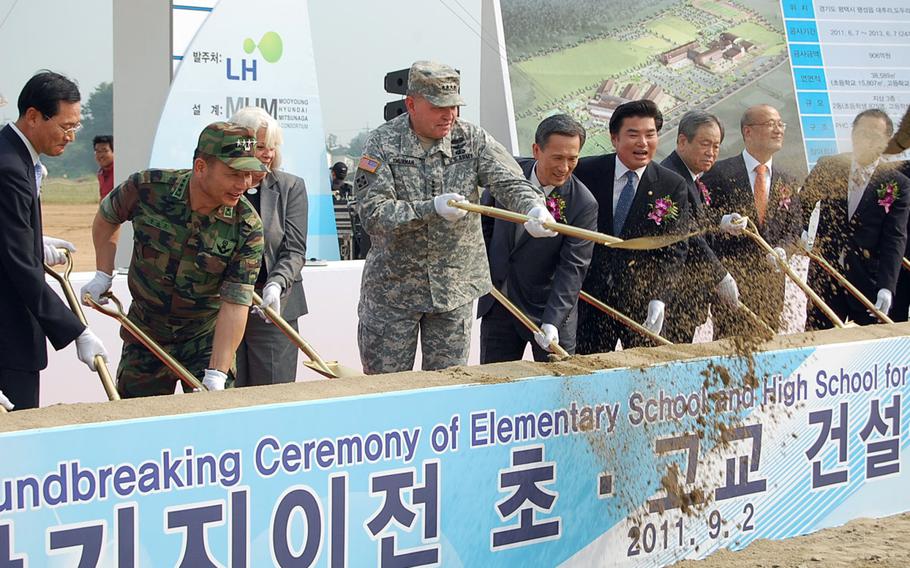
U.S. Forces Korea commander Gen. James Thurman shovels dirt Sept. 2, 2011, at a groundbreaking ceremony in Pyeongtaek for an elementary school and high school that will eventually serve the U.S. Army Garrison-Humphreys community. (Courtesy of U.S. Army Garrison-Humphreys)
SEOUL - Officials with two cities north of Seoul have expressed concern the U.S. military will not be moving out as scheduled in 2016, which would throw a wrench into the plans they have for the bases to be vacated.
"We have no anti-American sentiment - not even 0.1 percent," said Lim Sang-o, head of the Dongducheon Municipal Assembly's Emergency Measure Committee.
"But our government still keeps telling us nothing has been decided yet," he said. "What's going on between the United States and South Korea? What on earth can we believe? It's like they're trying to drive Dongducheon citizens into an abyss."
U.S. Forces Korea's 28,000 servicemembers are currently spread across more than 100 bases all over South Korea. The vast majority of those troops are scheduled to be moved in 2016 to regional hubs in Daegu and the Pyeongtaek/Osan areas, both south of Seoul. The scheduled move of American troops away from North Korea and the Demilitarized Zone is part of a multi-faceted plan designed to give the South's military a higher profile in the defense of its country.
When the consolidation of U.S. troops is completed, plans call for more than half the American bases to be turned over to South Korean control for other uses.
However, in recent months, reports related to U.S. military units have prompted officials in Dongducheon and Uijeongbu to go public with concerns that vacating the bases in their cities will be postponed, revised or canceled.
For months, USFK officials have declined Stars and Stripes' requests for information and interviews on the project.
Korean media have reported that the U.S. military was lobbying to leave the 210th Fires Brigade behind at Camp Casey in Dongducheon when troops are consolidated. U.S. officials are concerned their forces would not be able to respond quickly enough to a North Korean attack if the 1,500 soldiers and equipment of the Fires Brigade were based at Camp Humphreys in Pyeongtaek, 45 miles south of Seoul, as is planned, according to the reports.
But Dongducheon officials have plans to set aside parts of the Camp Casey property for a science park, a university and corporate development once the base is shuttered. They have said that leaving only about 20 percent of the troops now based at Camp Casey there after 2016 would be the worst scenario of all, because the city would not get the property, and there would be fewer U.S. soldiers spending money on the local economy.
Dongducheon officials have held protests outside the offices of the South's defense ministry and Camp Casey, and this month they launched a drive to collect 100,000 signatures across the peninsula on petitions, copies of which they plan to submit to - among others - the National Assembly, various ministries and the candidates in South Korea's upcoming presidential election asking that Camp Casey be vacated in 2016 and the property turned over to the city as originally planned.
Meanwhile, in nearby Uijeongbu, officials took note of the Pentagon's October announcement that the 23rd Chemical Battalion was moving back to South Korea in the months ahead. The battalion will provide "nuclear, biological and chemical reconnaissance, equipment decontamination and consequence management assistance" to support U.S. and South Korean forces, according to an Army statement.
Plans call for the 300 soldiers to be assigned initially to Camp Stanley in Uijeongbu, then moved to Camp Humphreys once facilities there are ready to accommodate them, an Army spokesman said.
Uijeongbu officials have voiced concerns with the Korean media about the open-ended nature of the plans to vacate Camp Stanley because agreements are already in place for Seoul's Konkuk University to develop a new campus on the base property in time to open in 2022.
In addition, the property now occupied by Camp Red Cloud - also in Uijeongbu - is scheduled to be turned into a park.
City officials reportedly have contacted the defense ministry about their concerns, and have publicly vowed to be on guard for any possible changes in the plan to vacate the camps.Uijeongbu planning officials, in a written statement, said having the two bases in their city has been important for national security, but it has also meant "disadvantages and problems, such as hindering regional development and infringing on the private ownership of people's property.
"We have no idea officially whether the relocation plan of USFK could be delayed," they said. "We feel confident if those bases are returned to us, those locations will be lands of opportunities for our regional development."